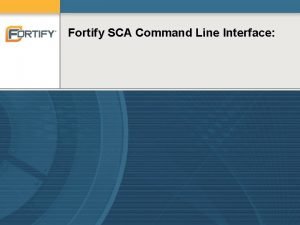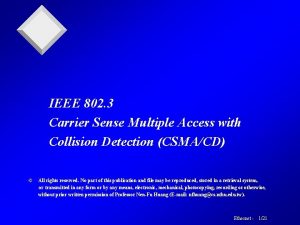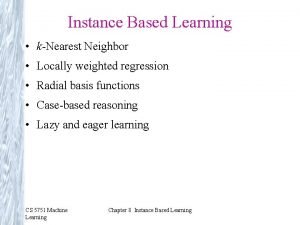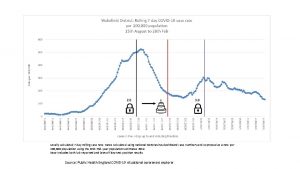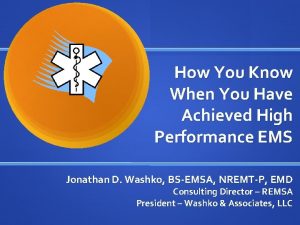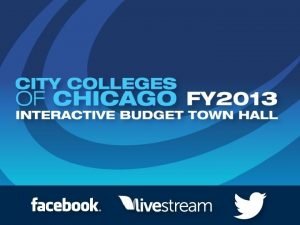Polypharmacy What have we achieved locally Liz Corteville













- Slides: 13

Polypharmacy What have we achieved locally? Liz Corteville Locality Lead Pharmacist West Hampshire CCG

NHS Scotland Polypharmacy 2012 • CCG Polypharmacy awareness event 2013 with homemade cakes! • Bruce Guthrie, Professor of Primary Care Medicine, University of Dundee Honorary Consultant NHS Fife and GP Cardenden Health Centre • Inspired hearts and minds – jobbing GP + research +++ • Primed GPs to do work on this • Medicines Optimisation Incentive Scheme – Patients taking 10+ medicines – Patients over the age 80 years

But…. • Although GPs were grateful that medication review had been done • Difficult to persuade them to deprescribe medicines • Had to find a better way of doing things… • Drew up a list of problematic drugs • Put together some resources in the form of detail aids/intervention briefs (from STOPP criteria/Presc. QIPP DROP list etc. ) • New Medicines Optimisation Incentive Scheme 2014/15 challenge to deprescribe especially from list of problematic drugs

Which patients should be targeted? • Patients in care homes age 50+ regardless of the number of medicines that they are on • Patients who are: – aged 75 and over, (progressing to 65 -74 as resources allow) – on a ‘high risk’/ possible problem medication from our list – combine with list of patients at risk of hospital admission (2%) which surgeries had compiled for their national DES (care-planning)

List of interventions Intervention Title Rationale Aspirin dipyridamole Secondary prevention ischaemic stroke prevention in absence of atrial fibrillation. Use clopidogrel instead and review if AF (OAC) Statins & ezetimibe In extreme old age, preserving function and avoiding frailty and injury in the short term may take priority over longer term goals such as preventing future cardiovascular events. Diuretics & CCBs Diuretics ineffective against ankle oedema from CCB’s Digoxin (especially high-dose) Few indications for digoxin. Often elderly patients with poor renal function (or not recently checked) & high dose. Confusion. Quinine salts Only modestly efficacious overall. Tinnitus, impaired hearing, headache, nausea, disturbed vision, confusion, flushing, and abdominal pain. Thrombocytopenia rare but potentially life-threatening. Significant drug interactions digoxin and warfarin. Very toxic in overdosage. Accidental fatalities.

List of interventions Intervention Title Rationale Opioids Especially strong opioid co-drugs, co-codamol 30 mg/500 mg. Data sustained analgesic efficacy in the long term lacking (but concerns over endocrine and immune function). ADRs +++ elderly patients (2 x 30 mg tabs qds relates to morphine 36 mg daily dose) constipation, confusion, falls Tolerance, dependence and addiction, opioid-induced hyperalgesia NSAIDs GI, CV, renal risks of NSAIDs & SSRI’s High risk of bleeding on combo. SSRI’s antiplatelet function PPI’s Rebound hypersecretion, Clostridium difficile infection, communityand hospital- acquired pneumonia, osteoporotic fractures, tubulointerstitial nephritis, cancer and hypomagnesaemia (especially with digoxin / drugs cause hypomagnesaemia e. g. diuretics) Bisphonates Long half-life in bone. Little evidence for use beyond 5 years. Risk of atypical femoral fractures and osteonecrosis of the jaw. Commonly cause upper-GI ADRs. Terrible compliance.

List of interventions Intervention Title Rationale -blockers/ 5 - reductase inhibitors & catheters -blockers and 5 - -reductase inhibitors used for obstructive prostate symptoms often continued inadvertently after permanent in-dwelling catheter inserted. Antimuscarinics (especially bladder anti-spasmodics e. g. oxybutnin) Associated with increased falls risk, impaired cognition and increased mortality. Can worsen autonomic neuropathy, angle-closure glaucoma, hiatus hernia with reflux oesophagitis, hyperthyroidism, coronary artery disease, congestive heart failure, hypertension, prostatic hyperplasia, arrhythmias, and tachycardia. Antipsychotics Increased risk of stroke (approximately 3 -fold in dementia) small increased risk of death. Other side-effects: extra-pyramidal symptoms, hypotension, dangerous falls, hyperthermia and hypothermia

List of interventions Intervention Title Rationale ACE-I&ARBs combo Dual therapy not recommended (except in certain specialist heart failure patients) due to increased risk of hyperkalaemia, hypotension, and impaired renal function. Triple whammy ‘Three simultaneous deleterious blows with compound effects’. 3 drugs alone or in combination implicated in > half iatrogenic cases AKI Warfarin/NOAC and aspirin AF reviews. Review of dual therapy in patients with stable IHD and no further need for antiplatelet therapy. High risk of bleeding on combo.

Results so far…. • In 2014/15: a total of 1677 recorded medicines were deprescribed (a few were changed or dose-adjusted) • Difficult to capture and measure changes • For 15/16 added in some new interventions ü e. g. triple whammy • Some quick wins ü e. g. quinine, anti-muscarinics • Some really important safety and quality improvements (even if small numbers) ü e. g. digoxin, triple whammy, ACE-I/ARB combos • Some challenging and difficult issues ü e. g. bisphonates, dual therapy in OAC

Deprescribing in Polypharmacy 14/15 Cardiovascular Analgesia Endocrine Other Aspirin & dipyridamole 78 Opioids 21 Bis- 258 phosphonates Statins & ezetimibe 48 NSAIDs 24 Alpha-blockers 16 Diuretics & CCBs 18 PPIs 24 Antimuscarinics 40 Digoxin 57 SSRIs & NSAIDs 15 Anti-psychotics 15 Quinine 799 TOTAL 14/15: ACE-I/ ARB combinations 82 Other 181 1677

Deprescribing in Polypharmacy 15/16 (to date) Cardiovascular Analgesia Endocrine Aspirin & dipyridamole 3 Opioids 22 Statins & ezetimibe 5 NSAIDs 5 Diuretics & CCBs 6 PPIs 25 Digoxin 35 SSRIs & NSAIDs 5 Quinine 306 Other Bis- 174 phosphonates ACE-I/ ARB combinations 0 5 Other 208 Anti- 382 muscarinics Specials 57 11 ACE –I/ARB + diuretic + NSAID (‘triple whammy’) 228 TOTAL Nov 15: 1487 Alpha-blockers Anti-psychotics

Future work • Continue polypharmacy work-stream with list of possible problematic drugs • Continuous improvement üe. g. digoxin • Include other drugs to the target list üe. g. amiodarone üe. g. mirabegron • Extend involvement in ICT/ whiteboard meetings • Extend nursing home work

Any questions? Email: liz. corteville@nhs. net Mobile: 07979337024
 Species vary locally
Species vary locally How do species vary locally
How do species vary locally Locally testable code
Locally testable code Think globally, act locally assignment
Think globally, act locally assignment Darwin's voyage of discovery
Darwin's voyage of discovery Fortify command injection
Fortify command injection The name tinikling is a reference to bird locally known as
The name tinikling is a reference to bird locally known as Locally administered address
Locally administered address Pid diagram
Pid diagram Dictionary managed tablespace
Dictionary managed tablespace Lesson 1 darwins voyage of discovery
Lesson 1 darwins voyage of discovery Species vary locally main idea
Species vary locally main idea Irit dinur locally testable codes
Irit dinur locally testable codes K nearest neighbors python
K nearest neighbors python





